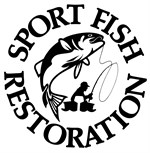
SPORT FISH RESTORATION (DINGELL-JOHNSON ACT)
A unique partnership, the Sport Fish Restoration Program (the Program) involves the cooperative efforts of state and federal wildlife agencies, the fishing tackle industry, anglers, and boaters. What started as an excise tax on rods, reels, creels, and fishing lures used to help fund US efforts during World War II was redirected in 1950 thanks to the efforts of outdoor enthusiasts Congressman John Dingell of Michigan and Senator Edwin Johnson of Colorado. While the original act has been amended several times it is still commonly referred to as the Dingell-Johnson Act.
The power behind the act comes from anglers and boaters. Excise taxes placed on fishing tackle such as rods and reels, line, hooks and sinkers, all types of artificial lures, electric motors, import duties on boats, sailboats and yachts, and a motorboat fuel tax on gasoline are collected and placed in a trust fund in the Department of Treasury in Washington, D.C. Without literally an act of congress, monies deposited in this fund are only available for sport fish management activities. Mississippi has greatly benefitted from the Program, having received about $100,000,000 since 1950.
So, how is this money used? Program funds are matched with State funds, usually as 25% State: 75% Program. State funds are generated through the sale of fishing licenses. The Program requires that funds be spent on sport fishing and boating related activities. Fisheries Bureau staff of the Department of Wildlife, Fisheries, and Parks annually sample public waters to look at the size of fish populations and make management recommendations based on this sampling. Sometimes these recommendations call for stocking more fish like largemouth bass, crappie, bluegill, and redear, or expanding fishing opportunities by stocking fish like striped bass, hybrid striped bass, and walleye. Our state hatcheries and fish production are funded by the Program. The state record largemouth bass, 18.13 lbs, from Natchez State Park is a product of our state hatchery system. Children are introduced to fish and fishing through the Department's fishing rodeo program and youth fishing day camps. Farm pond owners benefit by receiving technical guidance from fisheries staff on how to better manage their ponds. Boat ramps, courtesy piers, fish cleaning stations, and comfort stations on public waters throughout the state are built using Program funds.
Given that the Program and fishing related activities are powered by the fishing and boating community and receive little other assistance, the Sport Fish Restoration Program is truly "User Pays - User Benefits" or perhaps since the outdoors is open to anyone it may better be called "User Pays - Everyone Benefits".









